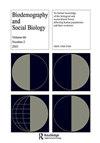Decomposition of Socioeconomic Changes in the Consumption of Micronutrients in Pakistan between 2006 and 2016
IF 0.9
4区 社会学
Q3 DEMOGRAPHY
引用次数: 1
Abstract
ABSTRACT This study is conducted to decompose inequality in four important micronutrient intakes, i.e. calcium, iodine, iron, and zinc due to socioeconomic factors during 2006–2016. For this purpose, data were taken from national-level surveys, i.e. HIES-2006 and HIICS-2016. We applied a recently proposed decomposition method based on copula function to decompose between year changes in the consumption of micronutrients into structure and composition effect. The results show that average calcium and iron intakes increased by 518.54 (mg) and 0.962 (mg), respectively, while average iodine and zinc intakes decreased by 2.009 (mg) and 3.411 (mg), respectively, during the decade. Estimates of structure effect show that calcium, iodine, and iron consumption increased on average, i.e. 525.316 (mg), 14.615 (mg), and 2.15 (mg), respectively, while zinc intake decreased by 2.735 (mg). The composition effect is negative for all the four micronutrients, implying that consumption of calcium, iodine, iron, and zinc decreased as 6.7766 (mg), 16.624 (mg), 1.189 (mg), and 0.677 (mg), respectively. The main factors of this change are household income, urbanization, provinces, and household size. The policymakers need to know the importance of socioeconomic factors to improve hidden hunger in terms of micronutrient intakes.2006年至2016年巴基斯坦微量营养素消费的社会经济变化分解
摘要本研究旨在分解2006-2016年期间由于社会经济因素导致的四种重要微量营养素摄入的不平等,即钙、碘、铁和锌。为此,数据取自国家层面的调查,即HIES-2006和HIICS-2016。我们应用了最近提出的一种基于copula函数的分解方法,将微量营养素消费的年间变化分解为结构和成分效应。结果表明,在这十年中,平均钙和铁摄入量分别增加了518.54(mg)和0.962(mg),而平均碘和锌摄入量分别减少了2.009(mg)或3.411(mg)。对结构效应的估计表明,钙、碘和铁的消耗量平均增加,分别为525.316(mg)、14.615(mg)和2.15(mg),而锌的摄入量减少了2.735(mg)。所有四种微量营养素的成分效应均为负,这意味着钙、碘、铁和锌的消耗量分别减少了6.7766(mg)、16.624(mg),1.189(mg)和0.677(mg)。这种变化的主要因素是家庭收入、城市化、省份和家庭规模。政策制定者需要了解社会经济因素对改善微量营养素摄入方面的隐性饥饿的重要性。
本文章由计算机程序翻译,如有差异,请以英文原文为准。
求助全文
约1分钟内获得全文
求助全文
来源期刊

Biodemography and Social Biology
Multiple-
CiteScore
1.50
自引率
0.00%
发文量
14
期刊介绍:
Biodemography and Social Biology is the official journal of The Society for the Study of Social Biology, devoted to furthering the discussion, advancement, and dissemination of knowledge about biological and sociocultural forces affecting the structure and composition of human populations. This interdisciplinary publication features contributions from scholars in the fields of sociology, demography, psychology, anthropology, biology, genetics, criminal justice, and others. Original manuscripts that further knowledge in the area of social biology are welcome, along with brief reports, review articles, and book reviews.
 求助内容:
求助内容: 应助结果提醒方式:
应助结果提醒方式:


